Brain Fitness: 3 Tools Anyone Can Use to Create Peak Performance
Peak Performance with Neurofeedback: Achieve the Flow State. Train your brain to perform at its best with Neuroptimal.
What impacts brain health and performance? More than you think! Learn what factors impact brain performance from genetics to the food you eat.
Last month I had the privilege of watching a live NBA basketball game - the Golden Gate Warriors played the Denver Nuggets. I love watching a live professional game: seeing athletes moving in and out of a state of flow, body and brain synchronized in peak performance is really a marvel to see up close. And it's just a pleasure to watch the world's most gifted athletes perform on the biggest professional stages. As a psychotherapist and brain trainer, for many years I've worked with clients trying to achieve peak emotional and mental performance in work, at school performance, in their personal and professional relationships and amateur sports.
 To watch these professional athletes is to see in action, how training the body, brain and mind can create awe-inspiring results. And sometimes, to us fans' surprise (and not unlike us, in many ways) a sudden sub par performance can seemingly pop up out of nowhere, despite years of training. This inconsistency in performance is evidence of the brain's complexity. In this article I'll use the example of an easy, missed shot by one of todays Superstar NBA players to discuss the factors that impact brain health and performance. And we'll find out why it's so difficult to predict the outcome of a single performance (so stop giving yourself a hard time, even the pro's aren't 100% all the time!)
To watch these professional athletes is to see in action, how training the body, brain and mind can create awe-inspiring results. And sometimes, to us fans' surprise (and not unlike us, in many ways) a sudden sub par performance can seemingly pop up out of nowhere, despite years of training. This inconsistency in performance is evidence of the brain's complexity. In this article I'll use the example of an easy, missed shot by one of todays Superstar NBA players to discuss the factors that impact brain health and performance. And we'll find out why it's so difficult to predict the outcome of a single performance (so stop giving yourself a hard time, even the pro's aren't 100% all the time!)
 Back to the game, which was super exciting. The crowd was locked in on every second of the action. The score was close - it see-sawed back and forth. Denver's star Center, Nikola Jokic went up to make an easy shot - no one was around him. He was within feet of the basket. And he missed. There was a collective groan in a sea of 18,000 people. What? How could that happen? Maybe not the best example but imagine lifting your coffee cup up - and missing your mouth. That's what it felt like we just witnessed.
Back to the game, which was super exciting. The crowd was locked in on every second of the action. The score was close - it see-sawed back and forth. Denver's star Center, Nikola Jokic went up to make an easy shot - no one was around him. He was within feet of the basket. And he missed. There was a collective groan in a sea of 18,000 people. What? How could that happen? Maybe not the best example but imagine lifting your coffee cup up - and missing your mouth. That's what it felt like we just witnessed.
The miss shocked everyone - and me. Here's someone who has easily logged 10,000 hours making shots. Truly an expert in his field, but someone he missed the one shot he could probably make blindfolded from that distance, 9 out of 10 times. What happened?
My curiosity got me thinking about how unpredictable and complex brain performance can be. And about how there are so many factors influencing the brain's performance in any given moment.
I recalled how dynamic the brain is as an organ, how it is significantly impacted by the outer and inner environments at any moment. All of those factors at play make it so that, surprisingly or not, the brain is not a 100% predictable performer. And that in turn makes our desire and even expectation for certainty in how we perform, feel so frustrating when we come up short.
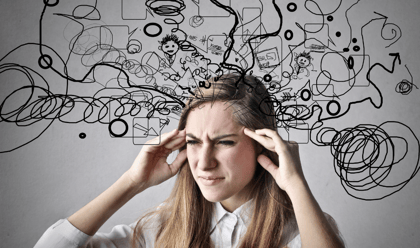 There are multiple internal and external factors that affect brain health and brain performance. The short list includes: sensory stimulation, genetics, health of the environment (which includes things like toxins) whether it is safe, our diet, exercise, quality of relationships and cognitive stimulation and educational supports.
There are multiple internal and external factors that affect brain health and brain performance. The short list includes: sensory stimulation, genetics, health of the environment (which includes things like toxins) whether it is safe, our diet, exercise, quality of relationships and cognitive stimulation and educational supports.
In order to make a complex topic like the brain and brain performance into an understandable one, we will often simplify the process and all of the variables involved. We do this as a skillful way to approach understanding the topic. Its like starting a car - we don't know each part of the engine by name, but overall - we know we can turn the key and something called "the ignition" starts everything. We employ a shorthand method of understanding to fast track us to grasping all the factors of the bigger picture. The negative result from simplification is that we forget to add back in the complexity and its sidekick: uncertainty and less predictable outcomes. We also do this for emotional reasons. We like to feel in control. Thinking the outcomes can be known with certainty gives us a feeling of mastery and power. As opposed to feelings of uncertainty, which we're not big fans of.
Let's go back to Jokic's missed shot and discuss the external and internal factors that impact brain performance. This is a good example for measuring success because the goal is a simple one - get the ball in the basket. And afterwards we'll add back in the complexity and look at the question of brain training and our expectations.
What are the environmental factors that will impact the brain's performance?
In Jokic's case we would look at the conditions in the stadium. Was there an overwhelming sensory experience like a loud sound or a bright light that impacted his performance in that moment? In general, environmental conditions play a role in the stress response. If we live under sensory conditions that are suboptimal, such as constant noise or not enough daylight, they can have an immediate or ongoing effect on our brain performance.
When Jokic was taking that shot there was no one in his immediate path blocking him so we could conclude that wasn't a major factor in his performance during that shot. Though perhaps earlier a player had insulted him or fans were booing. (Now we're getting into the complexity of how we can hold the negative impact of relationships in our minds and they can continue to affect us even after the exchange is over.)
In our daily lives though, relationships from those we are intimate with, friends and our community members, play a major role in brain health. All of the ways in which relationships factor into our brain health (and therefore performance) are too numerous to discuss here, but I want to mention a few. Starting with a fun fact: the larger a species' social network, the larger their brains. The more relationships we have the larger our brains have become over time, telling us if nothing else, relationships stimulate and grow our brains!
Another impact-factor is how others treat us. Friends, family members, loved ones - even a simple interaction at the grocery store affects our brain's production of the chemicals it needs to function and regulate emotions. For example, research shows students' whose work is praised by a teacher(s) lead to increased amounts of dopamine (our happiness brain chemical). Healthy dopamine levels leads to greater engagement socially and in learning, the healthier the brain. Another impact: the more social relationships we have growing up, the more neural networks we have as adults.
 Safety is defined by the brain based on likelihood of immediate serious bodily harm. When the brain perceives the potential of danger it heightens stress hormones and the fight/flight, or stress response. Research shows that these stress hormones negatively impact both brain and athletic performance.
Safety is defined by the brain based on likelihood of immediate serious bodily harm. When the brain perceives the potential of danger it heightens stress hormones and the fight/flight, or stress response. Research shows that these stress hormones negatively impact both brain and athletic performance.
It is not a given during a basketball game that the environment is safe. An elbow to the head, someone intentionally trying to cause a physical altercation, and unintentional accidents - happen frequently. But in the moment Jokic attempted that (relatively easy) shot there were no immediate dangers present. But regardless, the information present to him, was not enough to conclude he wasn't in a heightened stress reaction.
What are the internal factors that impact brain performance?
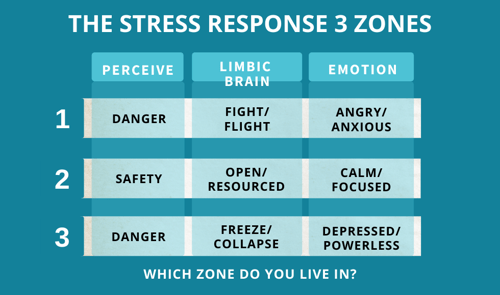 We know from many studies on Post Traumatic Stress Disorder (PTSD) that a large hinderance to appropriate and effective responses or athletic performance, is the fact that the brain becomes habituated to the stress reaction. In other words, finding simple environmental cues that are similar to the past can be enough for the brain to assume that the present is the same as a past experience - where there was actual danger. This habituation is common to all brains and why even non-traumatized individuals can find themselves reacting with yelling in a situation where it's not warranted, or being hypervigilant, when the current task needs a focused brain. Could Jokic's missed shot be from chronic stress? It could if a trigger, something in the environment in that moment which his brain interpreted as a signal to react with fight/flight, occurred, shifting his brain from focused brainwaves to ones that allow for scanning the environment, as example.
We know from many studies on Post Traumatic Stress Disorder (PTSD) that a large hinderance to appropriate and effective responses or athletic performance, is the fact that the brain becomes habituated to the stress reaction. In other words, finding simple environmental cues that are similar to the past can be enough for the brain to assume that the present is the same as a past experience - where there was actual danger. This habituation is common to all brains and why even non-traumatized individuals can find themselves reacting with yelling in a situation where it's not warranted, or being hypervigilant, when the current task needs a focused brain. Could Jokic's missed shot be from chronic stress? It could if a trigger, something in the environment in that moment which his brain interpreted as a signal to react with fight/flight, occurred, shifting his brain from focused brainwaves to ones that allow for scanning the environment, as example.
As much as we would like to think we're in control of our destinies, 50-70% of differences between individuals' cognitive performance, including reasoning, memory and processing speed is due to genetics. For physical performance, the range is higher - 30-80% of athletic performance can be accounted for by genetics. There are over 200 genes associated with physical performance, which may account for the wide range.
The environment your brain "grew up in" impacts your range of performance today. Back to complexity - even though we are taking about your brain performance today, or Jokic's during the game, we have to consider that your brain and your peer's will look and perform differently based on your childhood environment. Two areas of impact from childhood are how much neural density your brain has and how plastic it is. A less enriched childhood environment including schooling, safety and food at home, lead to less density and plasticity. In general, the more density and plasticity the better the brain performs as an adult.
Research shows that there is a significant correlation between socio-economic environment and cognitive enrichment and the child's brain development. In short the more stress in a child's life and the fewer intellectually enriching factors, such as books at home and a good school education, impact the development of their brains.

There is plenty of research showing the positive impact of diet on the brain's performance. The brain uses the most fuel of any organ in the body. And the type of fuel or calories you eat makes a difference on your brain performance. One well studied food is omega 3 fatty acids, or omega-3s, found mainly in fish like sardines, salmon, and cod liver oil, less so in flax and chia seeds. Omega-3s have been proven to impact cognitive performance and brain plasticity. There are also studies showing a lower incidence of depression in high omega-3 consuming countries. That's a significant relationship: the more fish consumed in a given country eats, the lower the national rates of depression. No surprise, Japan is the lowest.
Conversely, there are foods that damage the brain, such as sugar. Even though the brain uses glucose (sugar) as its fuel, too much of it causes the brain to shrink, decreases connectivity between brain regions, and it lowers our overall cognitive performance.
What Jokic ate before his game could have impacted his performance and that shot. Did he eat enough calories, or the right kinds of calories? Many NBA players eat peanut butter and jelly sandwiches before a game. Which upon analysis makes it a good example of addressing the complexity of the brain's needs. This food choice might seem odd but it makes sense when you think about the combined pre-game feeding of both the body's need for fuel and the brain's need for emotional regulation. Athletic output requires carbohydrates to burn. Check. And the association many people have with PB&J sandwiches are emotional security, hence triggering the brain to regulate out of a stress reaction and into calm. Makes perfect sense. What may have comforted you as a child, can supply equal emotional comfort as an adult.
 Sleep is essential to brain performance. Wondering what areas are impacted? Brain detoxification, emotional regulation, and cognitive function are the three big ones. An example we have all witnessed is the sleep-deprived child, prone to emotional melt-downs, an inability to think rationally, and make decisions easily. Research now shows chronic sleep deprivation, defined as five or less hours of sleep a night, is connected to chronic illness later in life. Poor sleep, less than 7-8 hours a night is correlated with decreased cognitive performance.
Sleep is essential to brain performance. Wondering what areas are impacted? Brain detoxification, emotional regulation, and cognitive function are the three big ones. An example we have all witnessed is the sleep-deprived child, prone to emotional melt-downs, an inability to think rationally, and make decisions easily. Research now shows chronic sleep deprivation, defined as five or less hours of sleep a night, is connected to chronic illness later in life. Poor sleep, less than 7-8 hours a night is correlated with decreased cognitive performance.
 Last in this list, but in terms of importance it might be first. How we talk to ourselves and the beliefs we hold both consciously and subconsciously (sorry for adding more complexity: how can I control a factor I'm not fully aware of?) are a form of brain training. Those subconscious beliefs include stereotypes and biases that are and have been, learned through conditioning in our families, schools and society. Self talk as simple as "I can do this." or conversely, "I can't do this." meaningfully impacts our performance and choices we make. Especially when we say it to ourselves over years.
Last in this list, but in terms of importance it might be first. How we talk to ourselves and the beliefs we hold both consciously and subconsciously (sorry for adding more complexity: how can I control a factor I'm not fully aware of?) are a form of brain training. Those subconscious beliefs include stereotypes and biases that are and have been, learned through conditioning in our families, schools and society. Self talk as simple as "I can do this." or conversely, "I can't do this." meaningfully impacts our performance and choices we make. Especially when we say it to ourselves over years.
A meta-analysis of over 60 studies on self-talk and athletic performance confirmed that self-talk has an important positive role in athletic performance. In other studies conducted by the Mayo Clinic showed that individuals who practiced turning negative self-talk into positive statements had lower stress, longer lifespan, overall better self-esteem and heart health.
Hopefully a conclusion you're forming about brain performance is: there's a lot of factors that impact how we perform at any given moment and over time. This truth is sometimes hard to remember as we also have a strong desire to feel liked due to our performance - whether on the basketball court, a meeting at work, or in a difficult conversation, we aren't in 100% in control at any given moment.
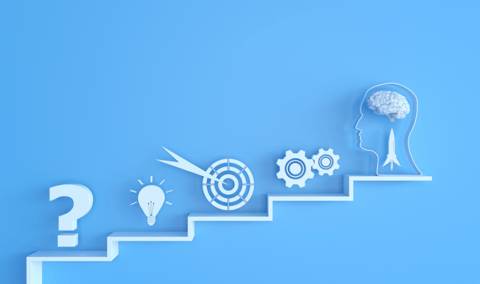
To summarize, there are many factors that impact how well you perform at a task, and some of those you'll never know, such as your genetic make-up. The others, such as our environment, the quality of social interactions, the food we eat, our sleep habits and how we talk to ourselves - form the beliefs (conscious and unconscious) that we hold about ourselves and our capabilities.
Now take all of these variables and imagine the brain's 100 billion neurons (as numerous as stars in the Milky Way) which form the network that make our experiences manifest. And that network operating at the speed of milliseconds (1/1000th of a second) and we get a little closer to understanding why we can't predict our performance in any given moment! Hopefully we will contemplate this inconceivable dynamic and appreciate the futility of giving ourselves a hard time because we "missed the shot". In whatever area of our lives, whether it's meeting a deadline, staying calm when our child is having a meltdown, or making a perfect sales pitch - sometimes we're going to miss. It's only human. And its only the habit of self-harrassment, and a delusion to think we could have perfect control.
Most of us are not trying to perform at a peak level in front of millions of viewers, although sometimes it feels like we are. Our goals are to be as healthy as is reasonably possible, to stay mentally sharp and emotionally well and be able to face our challenges and work towards our life goals.
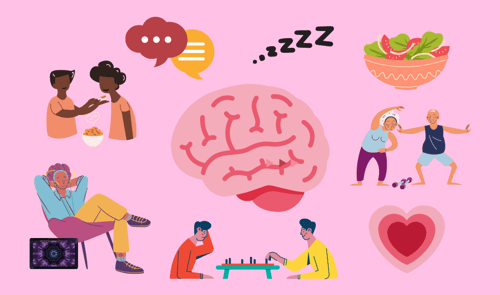 To those ends, what is a lifestyle that keeps our brains healthy? And conversely, what damages our brains?
To those ends, what is a lifestyle that keeps our brains healthy? And conversely, what damages our brains?
A simple principle to remember about what impacts brain health: anythings that increases blood flow to the brain and feeds the brain the nutrients it needs to function well, are helpful. Below are a few simple things to make sure your brains getting what it needs, to be its best.
Research shows exercise increases the mass of blood vessels that bring oxygen and nutrients to brain cells and assisted with removing waste. It also stimulates the growth of new nerve cells and of the connections between brain regions. Novel exercise is also important. Learning a new form of exercise such as pickleball or Tai Chi is shown to stimulate a critical region of the brain, the cerebellum. The cerebellum uses the most energy of any area of the brain and is the 'central coordinator' of movement and balance.
Challenging yourself with mental tasks such as Wordle, chess, or crosswords helps reinforce and create new neural connections in the brain. Novel learning, such as learning a new language, is key because it forces new connections between existing brain networks.
Much research has been done on the Mediterranean diet and its connection with aging well. Adherents of this diet live longer, have lower levels of dementia and better cognitive performance as they age. It's no accident the Mediterranean diet is high in fish, fresh vegetables, nuts, seeds, fresh fruits and healthy fats like olive oil. All super-fuels for the brain.
Besides the importance of an overall healthy diet there are specific nutrients that aid in brain health and cognitive performance. Those nutrients are the building blocks for brain cells and the chemicals or neurotransmitters used by the brain to help us perform mentally and keep us emotionally healthy. These include Omega-3s found in fish and some nuts and seeds; vitamin E and foods high in calcium and magnesium.
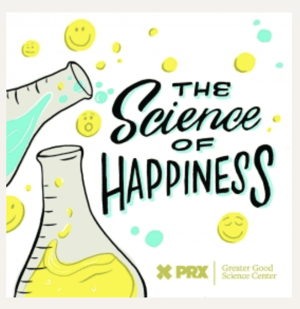 4. Care for your emotions.
4. Care for your emotions. The best way to care for our emotions along with getting exercise and eating well, is to become aware of our self-talk. We know the value of good sleep hygiene when trying to improve our sleep. But we also need to practice good mental hygiene. Using accurate and kind language when we talk to ourselves goes a long way in keeping ourselves calm and positive. Interested in learning new strategies to change your self talk? Here's a great podcast series created by UC Berkley's podcast on the science of happiness with topics to help shift your thinking.
The most robust study on what impacts and improves happiness over one's lifetime was a longitudinal study conducted by Robert Waldinger at Harvard University over a 75 year period. He and his colleagues interviewed a group of men over their lifespans. His Ted Talk on the findings has been viewed over 42 million times. What their study revealed is a good social network of friends and community adds to your wellness and happiness quotient. Part of the strategy of the happiest people was they did not allow themselves to be lonely. Specifically, the study showed that participants who were more isolated than they wanted, tended to be:
What affects the brain positively? In summary, a brain healthy lifestyle that includes exercise, a whole-foods based diet, intellectual stimulation, novel experiences and engagement with family, friends and connections in the greater community.
Add that all together and whether you're an athlete trying to maintain peak performance or a parent trying to learn brain health tips for better school performance, the first step is to recognize the complexity of the human brain. And to understand how many variables impact brain performance on any day so you can develop healthy expectations as you slowly improve your lifestyle. Over time, you can add the foods, activities and attitude that keep your brain the healthiest and you the happiest you can be, over a lifetime.
Natalie Baker has over 25 years of experience as a licensed psychotherapist and has been a NeurOptimal® neurofeedback trainer since 2011. She is the founder of Neurofeedback Training Co., which offers in-person sessions and runs the largest nationwide home rental program for NeurOptimal systems. Natalie also teaches meditation and Buddhist psychology and specializes in working with anxiety, stress, ADHD, and trauma.
Peak Performance with Neurofeedback: Achieve the Flow State. Train your brain to perform at its best with Neuroptimal.
You are what you eat. What are brain foods that hinder brain performance? You'll be surprised to learn all the foods that are out and which ones...
The advanced neurofeedback device by NeurOptimal optimizes brain function and performance - a workout for the brain, a boost for your brain.
Be the first to know about new blogs